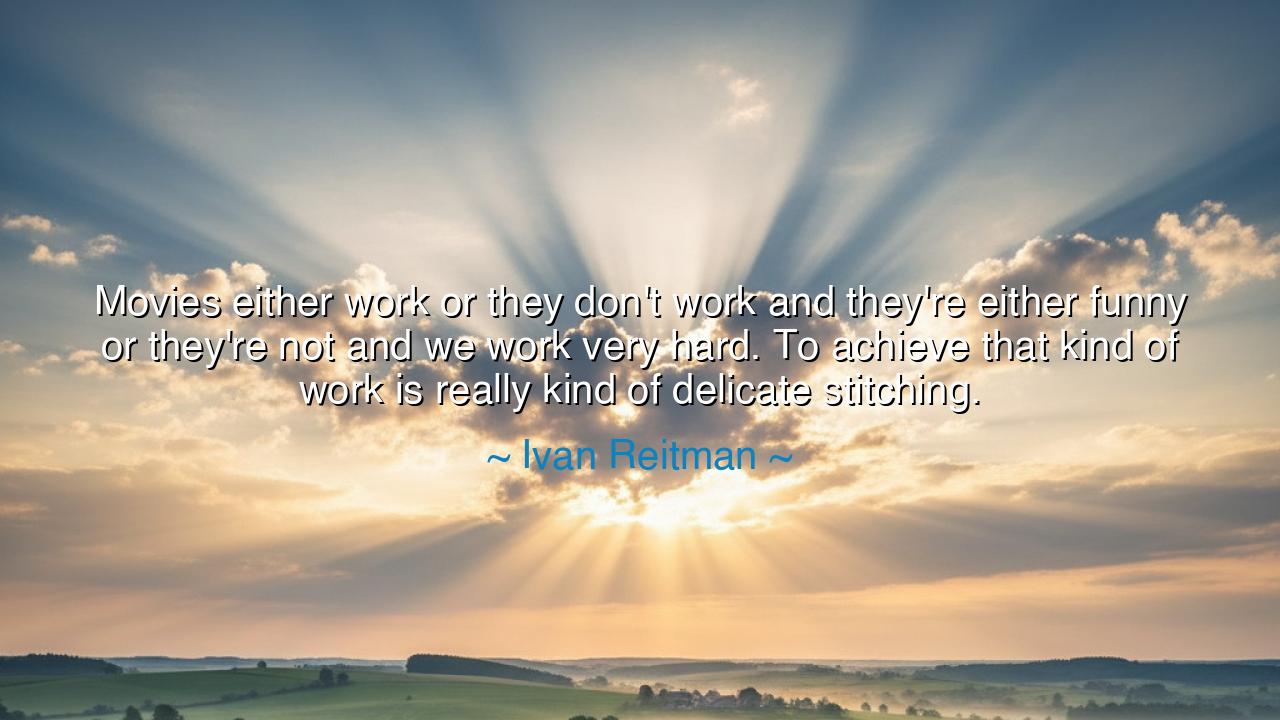
Movies either work or they don't work and they're either funny
Movies either work or they don't work and they're either funny or they're not and we work very hard. To achieve that kind of work is really kind of delicate stitching.






When Ivan Reitman spoke the words, “Movies either work or they don't work and they're either funny or they're not and we work very hard. To achieve that kind of work is really kind of delicate stitching,” he unveiled a truth that reaches far beyond the realm of cinema. In his confession lies the wisdom of all artistry: that the line between triumph and failure is thin, and that creation, no matter how great the labor behind it, is ultimately judged in its living form. Like a garment woven of fragile threads, a film—or any act of creation—must be stitched with care, for one loose seam can unravel the whole.
The delicate stitching he speaks of is not unlike the craftsmanship of the ancient weavers, who labored day after day at their looms. Each thread was vital, each pattern precise, and yet the whole depended not on strength alone but on harmony. So it is with film, where the actor’s delivery, the rhythm of the cut, the melody of the score, and the vision of the director must all converge into one seamless tapestry. Reitman reminds us that the measure of success is not partial—it is whole. A film either breathes with life, or it falls silent and cold.
Think, then, of the tale of the Parthenon in Athens, that temple raised to honor the gods. Its columns and carvings were the result of countless skilled hands, each artisan contributing a fragment. Yet it was not the stones themselves that made it great, but the balance, the proportion, the hidden geometry that bound them together. So too with Reitman’s art: each joke, each scene, each pause must be laid with precision, or the harmony collapses. Greatness in art is never in accident; it is in the unseen hands of those who stitch the pieces into unity.
Reitman himself knew this truth in the making of Ghostbusters, a film that seemed, on paper, a strange marriage of the absurd and the supernatural. Yet through tireless labor, through countless small adjustments—the stitching of timing, the threading of character with comedy—what could have been foolish became legendary. The people laughed, not because of chance, but because Reitman and his companions had labored to hide the stitches, to make the tapestry whole and alive.
From this, O listeners, take heed: in your own works, whether of art, labor, or life, understand that success does not come from grand gestures alone. It is born in the small stitches, the unseen moments of care, the quiet devotion to detail that others may overlook. A single flaw left untended may grow into ruin, but a thousand small acts of precision create a thing that endures.
The lesson is simple yet eternal: do not be deceived by the illusion that greatness is sudden or effortless. Behind every work that moves the heart lies a long toil of hidden stitches. Rejoice not only in the finished tapestry but also in the craft of weaving itself. For when you honor the process, the result will often honor you.
So let your practical actions be these: in your labors, attend to the details with patience; in your relationships, mend the small tears before they widen; in your pursuits, recognize that greatness is the sum of many delicate parts. Do not despise the small stitch, for it is the bond that holds the whole together. And remember always Reitman’s truth: the world sees only whether the work lives or dies, but the creator knows—it is the hidden stitching that makes all the difference.
Thus, may you be like the ancient weavers and the modern storytellers, crafting your works with diligence, so that when the tapestry of your life is revealed, it will stand whole, harmonious, and enduring. For the world, like the audience in Reitman’s cinema, will know only this: it either works—or it does not.






AAdministratorAdministrator
Welcome, honored guests. Please leave a comment, we will respond soon